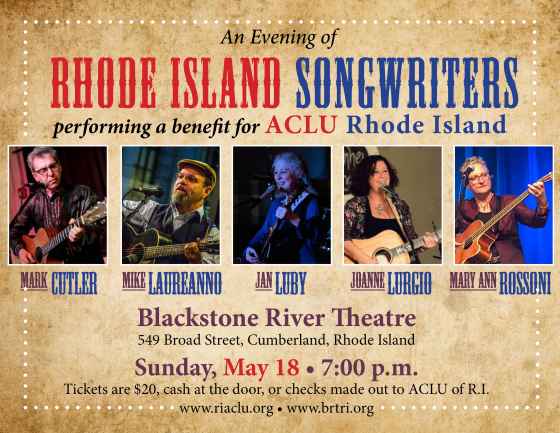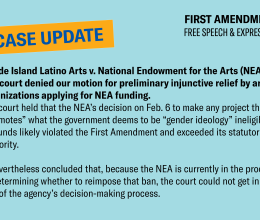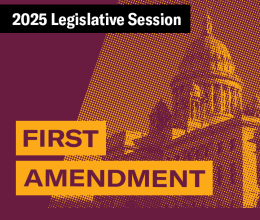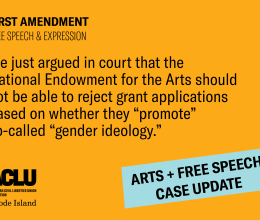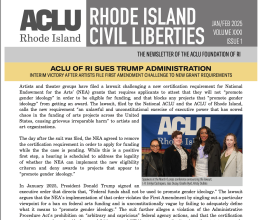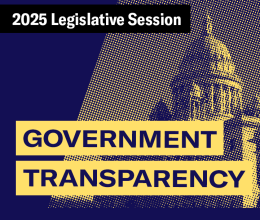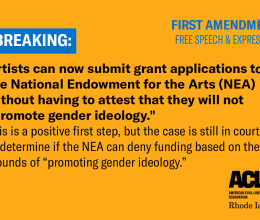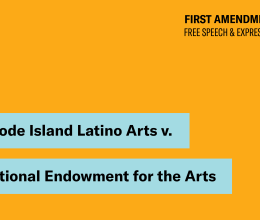It may be the season of giving, but in some Rhode Island communities, those seeking the kindness of others often face punishment simply for asking for help. That dichotomy is being challenged by the American Civil Liberties Union of Rhode Island today in a federal lawsuit on behalf of a disabled person summoned to court and threatened with arrest for holding a handwritten sign seeking donations as he stood on the median of a Cranston roadway.
The suit, against the City of Cranston, argues that a city ordinance barring the solicitation of donations from motorists violates free speech rights. In announcing the filing of the suit, the ACLU and homeless rights advocates stressed that in addition to being unconstitutional, ordinances like these are selectively enforced against, and further criminalize, the poor and homeless.
The ACLU additionally announced that it expected this lawsuit to be the first of a series of suits addressing municipal ordinances that criminalize poverty and homelessness.
Michael Monteiro, the suit’s plaintiff, is disabled and supplements his disability payments by soliciting charitable donations. He has occasionally stood on a median on Plainfield Pike holding a sign that reads: “disabled, need help, God bless.” On June 30th, a Cranston police officer saw Monteiro soliciting donations, wrote him a court summons for violating the ordinance, and ordered him to leave the area. The officer further told Monteiro that he would be arrested if he returned to solicit donations. A Municipal Court Judge ultimately dismissed the charge, which carries a fine of up to $200, but told him to stay away from the area.
Today’s suit, filed in U.S. District Court by ACLU volunteer attorney Marc Gursky, challenges the ordinance, which prohibits individuals from performing any “acts of solicitation” or requesting donations from anyone in a vehicle travelling on or stopped on a road. The ACLU’s suit argues that the ordinance infringes on individuals’ free speech rights in a public forum “where the government’s power to regulate speech is most constrained,” is unconstitutionally vague, and improperly bars individuals from standing on or near the road based entirely on the content of their message. The City, the suit alleges, has enforced the ordinance selectively by removing “panhandlers” trying to make ends meet while allowing other individuals and groups to solicit motorists while fundraising for various causes.
ACLU attorney Gursky said today: “As written, Cranston’s ordinance violates everyone’s right to ask for donations, whether they’re firefighters or little leaguers, but it’s especially unfair to people who are homeless or otherwise in need. Cranston needs to do the right thing and repeal this ordinance.”
Plaintiff Monteiro added: “All I am doing is exercising my right to express myself, and letting people know of my life and my needs. I should have that right. I’m not harming anybody. If a person can display a sign saying ‘Vote for Hillary’ and solicit votes, why can’t I display my sign?”
ACLU of RI executive director Steven Brown said: “Individuals struggling with homelessness or poverty are too often punished for ‘crimes’ that no other individuals face. Prohibiting someone from standing on public property because the City doesn’t like what they are saying is a clear First Amendment violation. To enforce this prohibition against only those trying to scrape by while allowing others to do the same to benefit sports teams and charities only adds insult to injury. We hope this lawsuit will end Cranston’s current policy and remind all other communities that free speech rights apply to everyone.”
Megan Smith, an outreach worker and case manager with the House of Hope's PATH program, said: “The Cranston ordinance is yet another example of the ways in which our society criminalizes acts of survival for people who are poor and homeless. Giving people a criminal record for doing what is necessary to live only makes it harder for these individuals to access housing, employment, and means of support, and costs the state and taxpayers more in the process.”
The ACLU lawsuit seeks a court order declaring the ordinance unconstitutional and prohibiting its enforcement. The suit also seeks compensatory damages for Mr. Monteiro and attorney’s fees.

